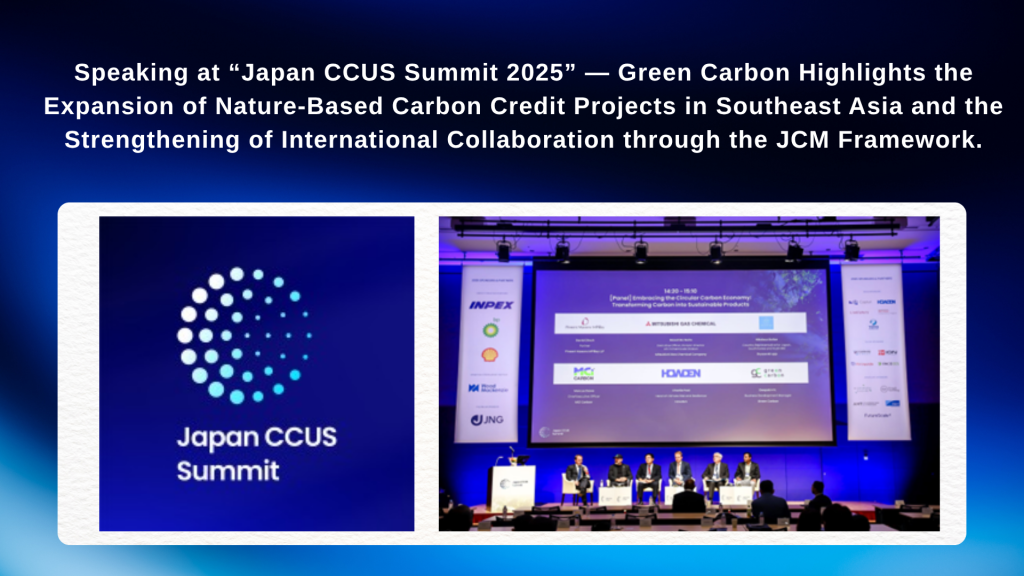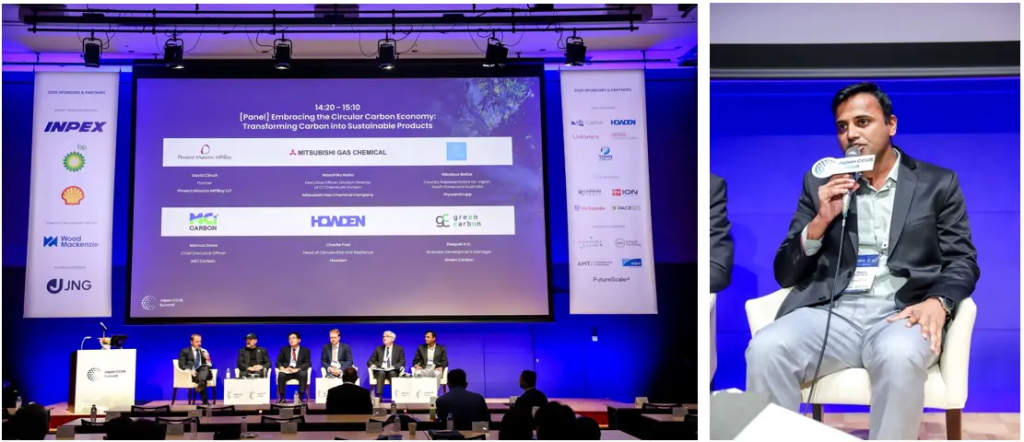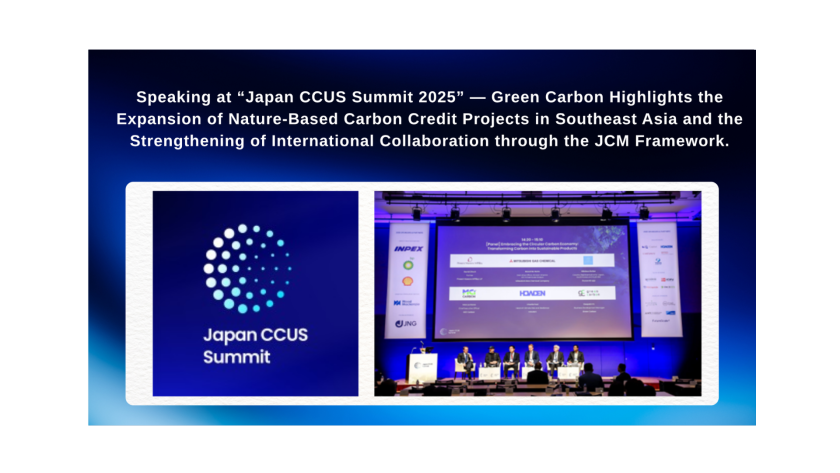
Transforming Carbon from “Liability” to “Asset”: Showcasing a Next-Generation Model for a Circular Carbon Economy.
Green Carbon Inc. (Representative Director: Jun Okita, hereinafter referred to as “Green Carbon”), a company engaged in the development and sales of nature-based carbon credits, is pleased to announce its participation as a speaker at the Japan CCUS Summit 2025 (hereinafter referred to as “the Summit”) held in Tokyo in October 2025. Under the theme “From Vision to Reality,” the Summit discussed the commercialization of CCUS (Carbon Capture, Utilization and Storage*) in Asia and the roadmap toward realizing a Circular Carbon Economy. Speaking from the perspective of a carbon credit developer, Green Carbon emphasized the importance of rethinking carbon—not as a liability, but as a sustainable and profitable industrial asset. The company introduced its initiatives to expand large-scale, nature-based carbon credit projects in Southeast Asia and to strengthen international collaboration through frameworks such as the Joint Crediting Mechanism (JCM).
〇For inquiries regarding this release or further information, please contact us.
〇For more information, download Green Carbon Inc.’s company profile here.
◆ Presentation Details at the Summit
At the Summit, Green Carbon participated in the high-level panel discussion titled “Embracing the Circular Carbon Economy”, where the company introduced its “Carbon-to-Value (C2V*3)” model, which redefines carbon as a new value-generating resource. Green Carbon emphasized the importance of viewing CCU (Carbon Capture and Utilization) not merely as an emission reduction technology, but as a mechanism to create industrial added value. The company also showcased its international projects aimed at the commercialization of C2V technologies, including next-generation synthetic fuels, carbon-derived chemicals, and carbon mineralization.
| ① Expertise in CCU/C2V Technologies: Promoting the commercialization of carbon utilization technologies that convert captured CO₂ into valuable resources and products. |
| ② Expansion of Large-Scale Nature-Based Carbon Credit Projects: Advancing high-quality carbon removal (CDR) initiatives internationally, including biochar projects and Japan’s first and largest J-Credit paddy field project utilizing Alternate Wetting and Drying (AWD) techniques. |
| ③ Strengthening International Collaboration: Expanding business in Southeast Asian countries such as Thailand, Vietnam, and the Philippines through international frameworks like the Joint Crediting Mechanism (JCM), aligning Japan’s decarbonization goals with sustainable regional development. |
Through the above initiatives, Green Carbon aims to transform captured carbon into valuable and stable products, thereby enhancing corporate resilience while creating a positive cycle that accelerates global decarbonization.
By establishing a circular structure in which carbon is reused and reproduced, the company seeks to build an industrial model that achieves both decarbonization and economic growth.

〇Speaker: Mr. Deepak, Manager, Overseas Business Department, Green Carbon Inc.
◆Outlook For the future
Green Carbon is engaged in the creation of nature-based carbon credits primarily in Southeast Asia, carrying out projects across a wide range of fields such as forest conservation, paddy fields, mangrove reforestation, methane reduction from cattle, and biochar production.
By developing carbon credit projects tailored to the characteristics of each region’s natural resources and utilizing satellite data for site selection and monitoring, the company ensures efficient and highly transparent project operations.
Against this backdrop, discussions at this Summit further accelerated across Asia toward the arrival of the “CCUS 2.0 era.”
Within this momentum, Green Carbon presented three key strategic directions aimed at establishing a sustainable carbon cycle.
| ①Acceleration of Regional Collaboration: |
|---|
| Promote the early establishment of international agreements on CO₂ storage and trading in countries such as Australia, Indonesia, and Malaysia, ensuring both economic feasibility and scalability. |
| ②Stabilization of Policy and Investment Frameworks: |
|---|
| Engage in dialogue with governments to develop stable policy and funding schemes, which are key to mobilizing private capital into both technology-based and nature-based carbon removal projects. |
| ③Advancement of MRV (Measurement, Reporting, and Verification): |
|---|
| The expansion of a trustworthy carbon market requires clear and standardized MRV criteria. Green Carbon’s highly reliable carbon credit generation platform, “Agreen*4,” plays a central role in this process. |
Moving forward, Green Carbon will continue to support the decarbonization of companies and local communities through both nature-based and technology-based approaches, contributing to the realization of a circular carbon economy that transforms carbon from a liability into an asset.

〇Photo from the Summit Presentation
◆Overview of Japan CCUS Summit 2025
At this Summit, government officials, industry leaders, and academic experts gathered to discuss the latest trends and policy issues toward the realization of a Circular Carbon Economy.
Event Name: Japan CCUS Summit 2025
Theme: From Vision to Reality
Location: Tokyo, Japan
Date: October 2025
Organizers: A collaborative platform of domestic and international industry players, research institutions, and policy organizations
Objective: To promote the commercialization, deployment, and international collaboration of CCUS (Carbon Capture, Utilization and Storage) across the Asia region
URL: https://www.japanccussummit.com/
*1: CCUS (Carbon Capture, Utilization and Storage)
An acronym that combines the concepts of “CCS (Carbon Dioxide Capture and Storage)” and “CCU (Carbon Dioxide Capture and Utilization).”
It refers to technologies that capture CO₂ and either store it underground (CCS) or utilize it for industrial purposes (CCU).
*2: Joint Crediting Mechanism (JCM)
A bilateral crediting scheme in which Japan and partner countries cooperate to reduce or remove greenhouse gas emissions, and share the quantified reduction or removal results between the two countries.
In Japan, these quantified results can be used as carbon credits, and the government aims to secure approximately 100 million t-CO₂ by FY2030 and 200 million t-CO₂ by FY2040 through this mechanism.
*3: Carbon-to-Value (C2V)
A new industrial concept that views carbon dioxide (CO₂) not as waste, but as a valuable resource.
It focuses on technologies that capture, transport, and convert CO₂ into high-value products and services, such as synthetic fuels, building materials, and plastics, thereby generating economic value from carbon.
*4: Agreen
A one-stop platform that supports the entire carbon credit process—from creation, registration, and application to sales.
It enables revenue simulation for credits and simplifies complex administrative procedures, reducing the workload of credit generators such as farmers while contributing to decarbonization.
https://d201rsmroi44j6.cloudfront.net
◆Green Carbon Inc.
Representative: Jun Okita, Representative Director
Head Office: PREX North 9F, 2-3-2 Kojimachi, Chiyoda-ku, Tokyo, Japan
Established: December 12, 2019
Business Description:
Development and sales of carbon credits; agriculture-related and environmental businesses; ESG consulting; and other related services.
Website: https://green-carbon.co.jp/
◆Overview of Green Carbon’s Business
Guided by its vision “Saving the Earth through the Power of Life,” Green Carbon Inc. develops and operates an integrated business that supports the creation, registration, and sale of nature-based carbon credits both in Japan and overseas.
In addition, the company is engaged in agriculture-related projects, research and development, and ESG consulting services. Green Carbon’s business has expanded from Japan and Southeast Asia to regions including Australia and South America, where the company implements a variety of nature-based carbon credit projects such as paddy field initiatives, biochar production, forest conservation, carbon farming, mangrove reforestation, and methane reduction from livestock. In Japan, Green Carbon obtained certification for the country’s first and largest J-Credit paddy field project (approximately 6,220 t-CO₂) in FY2023, and plans to expand the project to around 40,000 hectares (about 80,000 t-CO₂) in FY2024. The company also provides “Agreen,” a one-stop platform that streamlines the entire carbon credit process—from registration and application to sales—simplifying documentation and administrative procedures while reducing the workload for credit creators.

